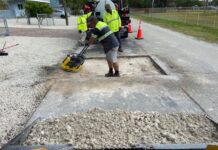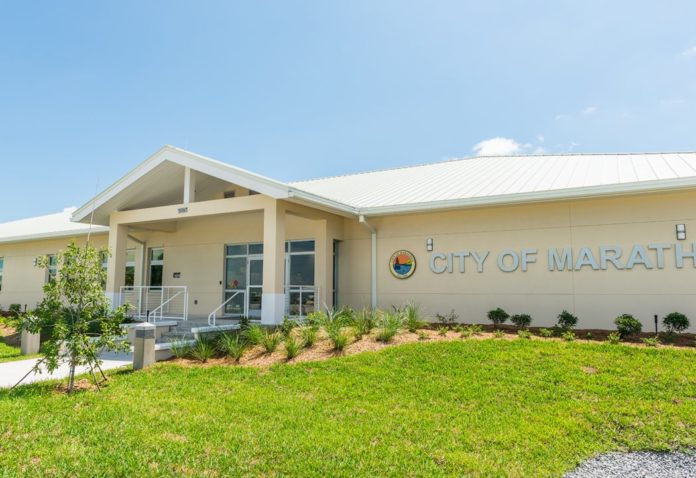The City of Marathon has set its preliminary millage rate at 2.59 mills for 2020. That rate can be lowered at future meetings, but cannot go higher. Finance Director Jennifer Johnson said it’s the same rate as was collected in ad valorem (property taxes) since 2018.
But it is a tax increase, as property values have climbed.
“That will be a 5.89 percent tax increase,” Johnson said.
The preliminary budget also anticipates FEMA reimbursement of $12 million for Hurricane Irma costs — $4.6 million in 2020 and $7.4 million in 2021. So far, the City of Marathon has received a total of $414,000 in FEMA reimbursements although the city suffered an estimated $29 million in damages. The city took out a $10 million line of credit, but it has yet to be used. Instead, the city has been putting projects on hold, and paying for projects as money and grants roll in.
The 2020 budget includes items such as a 2.2% cost-of-living raise for staff, new software for the building department, and additional staff positions including two firefighters, an engineering intern, a lead maintenance mechanic, part-time beach custodian and part-time scanning position in the building department. There is also an additional cost for the election this year, as the City of Marathon can no longer “piggy back” on county elections because they are out of sync due to three-year terms.
There will be another budget discussion on Aug. 13. The first public hearing is Sept. 13 and the final one is Sept. 19. Both meetings begin at 5:05 p.m. at Marathon City Hall.
The budget discussion prompted another talk about reserves in the general fund for hurricane expenses. Prior to Hurricane Irma, the city had $6 million in reserve, which is equal to six months of operating expenses for the city. Council members indicated that they would like to rebuild the reserve to about $12 million which equals a year of operating expenses, or the same cost of debris removal (only) following Irma. That will likely mean another tax increase, and council has agreed to wait another year.
Mayor John Bartus and the other council members recognized staff’s fiscal responsibility.
“Our finance director and department heads are cognizant that this is taxpayer money funding all the projects, like the reconstruction of Sombrero Beach,” said Bartus. “We have had a balanced budget for the past two years with the same millage rate and haven’t tapped the line of credit. We’re in damn good financial shape compared to what it could have been.”
Park use & fees
City Manager Chuck Lindsey asked the council for permission to create a fee schedule for use of city parks to bring before the board for approval. Many organizations ask the city to waive the fees as events often support nonprofits.
“There’s more costs incurred than people realize with events — overtime costs for the fire department, sheriff deputies, parks and recreation staff and repair the field,” said Lindsey. “I want to take staff and come up with a fee schedule that will hold. It doesn’t have to be a lot, but it has to balance the amount going out and the amount coming in. The discrepancy wasn’t that obvious pre-Irma, but now it’s very obvious.”
The council was unanimous in its support, and Councilman Luis Gonzalez floated the idea of an admission fee rider. Councilman Dan Zieg also suggested promoting Oceanfront Park behind City Hall and the The Quay property as alternate sites for smaller events to relieve pressure on Marathon Community Park. Currently, the city only collects a $250 deposit fee.
In other news:
- The cost of new sod or grass for the Marathon Community Park has almost doubled and now stands at $202,944. The project is almost complete.
- The council approved a $1.75 million contract with H&R to rebuild the bike path on Aviation Boulevard. The funds are provided by the state Department of Transportation. If the FDOT signs off, the work could start in about a month. The contract covers the infrastructure for the lighting, but not the lighting itself.
- Marathon Parks and Recreation Director Jimmy Schmidt said the cost of re-installing shade structures that are up to code at Marathon Community Park could cost more than $50,000. The old shade structures were improperly installed, too close to playground equipment. Council asked the budget director to explore whether it could be incorporated into the budget.
- The council received a report comparing the efficacy of the former code board versus the current special magistrate. The city changed to a special magistrate to judge code cases in August of 2018. In 2016, the code board heard 34 cases, and from 2018-2019, the magistrate heard 46. Costs are about equal — $175 per hearing for the code board, and $177 per hearing for the special magistrate.

























